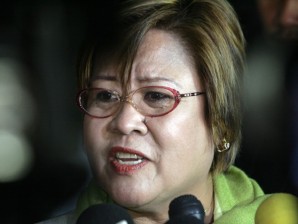The Judicial and Bar Council (JBC) begins Tuesday interviewing the men and women aspiring to become the 24th Chief Justice of the Supreme Court.
Among the first to be interviewed from 9 a.m. to 12 p.m. are Presidential Commission on Good Government Chairman Andres Bautista, law professor Soledad Cagampang-de Castro and Justice Secretary Leila de Lima.
They will be followed by Free Legal Assistance Group chair Jose Manuel Diokno, Solicitor General Francis Jardeleza and women’s rights and family lawyer Katrina Legarda between 2 p.m. and 5 p.m.
To be interviewed on Wednesday are Supreme Court Justice Roberto Abad, law professor and Sycip Salazar Hernandez & Gatmaitan managing partner Rafael Morales, Inquirer columnist and former University of the Philippines law dean Raul Pangalagan, Justice Arturo Brion, Elections Commissioner Rene Sarmiento and retired Judge Manuel Siayngco Jr.
On Thursday facing the JBC would be University of the East law dean and former government corporate counsel Amado Valdez, lawyer and chair of the government negotiating panel with the National Democratic Front Vicente Velasquez, Senior Associate Justice Antonio Carpio, Justice Leonardo de Castro and Ateneo de Manila University law dean Cesar Villanueva.
On Friday, Securities and Exchange Commissioner Teresita Herbosa, Cagayan de Oro City Representative Rufus Rodriguez, former Executive Secretary and former San Juan City Rep. Ronaldo Zamora, and Justices Ma. Lourdes Sereno and Presbitero Velasco Jr. will be interviewed.
Justice Diosdado Peralta, JBC chairman, said the interviews will be lively.
“We will not let them feel nervous,” he told reporters. Last Friday, Peralta and other JBC members inspected the Supreme Court hearing room where the interviews would be conducted.
The interviews will be aired over television and radio through government TV station NBN-4.
The public can send questions by e-mail to JBC at jbc@sc.judiciary.gov.ph and jbc87supremecourt@gmail.com, Facebook (https://www.facebook.com/jbcl.supremecourt) and Twitter (@SupremeCourtJBC).
100 seats for public
Forty seats in the hearing room and 60 seats in the Supreme Court lobby will be provided to the public on a “first come, first served” basis.
Lawyer Jose Mejia, JBC member representing the academe, told reporters the aspirants will be queried about their independence.
“Independence is crucial because it is one of the criteria laid down by the rules. But equally important is that he or she should also be perceived by the public as being independent,” he said.
The JBC will also scrutinize the candidates’ competence, integrity and probity as stated in Article VIII of the Constitution.
For the first time, the JBC will look into the wealth and properties of the candidates through their statements of assets, liabilities and net worth, and the waivers of secrecy of the bank deposits that they had submitted to the JBC, Mejia said.
The aspirants, he added, would also be asked to comment on the statements of opposition to their nominations that several groups and individuals had filed.


